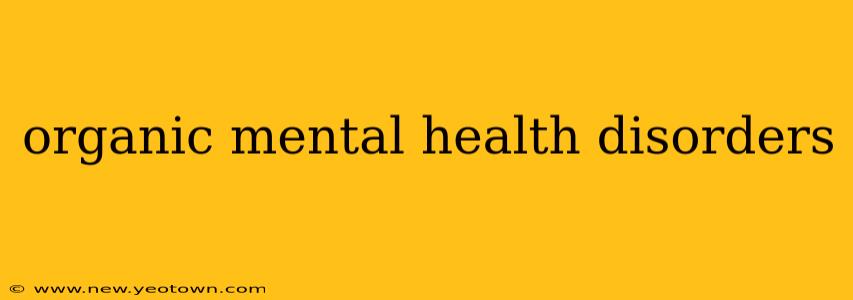Organic mental health disorders, a fascinating and often misunderstood area of mental health, represent a significant bridge between physical and psychological well-being. Unlike disorders stemming solely from psychological factors, these conditions arise from identifiable physical causes affecting the brain. Think of it like this: the brain, a remarkably intricate organ, can malfunction due to various physical ailments, manifesting as changes in mood, behavior, and cognition. This journey will explore the multifaceted nature of these disorders, dispelling myths and shedding light on their complexities.
What are Organic Mental Health Disorders?
Organic mental disorders, also known as organic brain syndromes, encompass a broad spectrum of conditions where a demonstrable physical brain impairment underlies the mental health symptoms. These impairments can stem from various sources, including injuries, infections, tumors, or degenerative diseases. The key distinction lies in the causality: the mental symptoms are a direct consequence of a physical brain problem. This contrasts with functional mental disorders, where the cause is less easily pinpointed to a specific physical factor.
Imagine a finely tuned instrument – the brain. When a part of this instrument is damaged or malfunctions, the music it produces (our thoughts, feelings, and behaviors) will inevitably change. That's the essence of organic mental health disorders.
What are some examples of Organic Mental Health Disorders?
The range of organic mental health disorders is vast and varied, reflecting the diverse ways the brain can be affected. Some prominent examples include:
-
Delirium: This acute state of confusion, often characterized by fluctuating levels of consciousness, disorientation, and impaired attention, frequently stems from infections, medication side effects, or metabolic imbalances. Imagine waking up from surgery disoriented and confused – this is a common example of delirium.
-
Dementia: This progressive decline in cognitive abilities, impacting memory, thinking, and judgment, encompasses several subtypes, including Alzheimer's disease, vascular dementia, and Lewy body dementia. Each type has its unique underlying physical causes and progression. Thinking about a loved one struggling to remember recent events or even their own identity highlights the devastating impact of dementia.
-
Traumatic Brain Injury (TBI): Resulting from a blow or jolt to the head, TBI can lead to a wide array of cognitive, emotional, and behavioral problems. From mild concussions to severe injuries, the consequences can be long-lasting and profoundly affect a person's life. Picture a soldier sustaining a head injury in combat, struggling with memory loss and emotional regulation – that's the reality of TBI.
-
Substance-Induced Mental Disorders: The misuse or overuse of certain substances, such as alcohol, drugs, or medications, can directly harm brain cells, leading to symptoms resembling other mental health disorders like psychosis or depression.
-
Infections of the Central Nervous System (CNS): Conditions like encephalitis (brain inflammation) and meningitis (inflammation of the membranes surrounding the brain and spinal cord) can directly impair brain function and cause severe mental health consequences.
What causes Organic Mental Health Disorders?
The causes of organic mental health disorders are as diverse as the disorders themselves. Several factors can contribute:
-
Neurological Conditions: Diseases like Alzheimer's, Parkinson's, multiple sclerosis, and stroke can directly damage brain tissue, leading to cognitive and emotional changes.
-
Infections: Viral or bacterial infections affecting the brain can cause inflammation and impair its function.
-
Traumatic Brain Injury: Impacts to the head can result in brain damage, leading to a range of cognitive and behavioral issues.
-
Toxic Exposures: Exposure to toxins like heavy metals or certain chemicals can harm brain cells.
-
Nutritional Deficiencies: Lack of essential nutrients can impair brain function.
-
Metabolic Disorders: Conditions affecting the body's metabolism can disrupt the brain's proper functioning.
How are Organic Mental Health Disorders diagnosed?
Diagnosing organic mental health disorders requires a thorough evaluation, involving:
-
Medical History: A comprehensive review of the individual's past health, including past injuries, illnesses, and substance use.
-
Neurological Examination: Assessing reflexes, coordination, and sensory functions.
-
Neuropsychological Testing: Evaluating cognitive functions like memory, attention, and executive functions.
-
Neuroimaging Techniques: Utilizing technologies such as CT scans, MRI scans, and PET scans to visualize the brain and detect abnormalities.
-
Blood and Other Lab Tests: Identifying underlying medical conditions that might be contributing to the mental health symptoms.
Can Organic Mental Health Disorders be treated?
Treatment for organic mental health disorders depends on the underlying cause. While some conditions might be irreversible, many are treatable, aiming to manage symptoms and improve quality of life. Treatment options often include:
-
Medication: To address specific symptoms, such as anxiety, depression, or psychosis.
-
Therapy: To help individuals cope with the emotional and cognitive challenges associated with the disorder.
-
Supportive Care: Providing assistance with daily living activities.
-
Lifestyle Modifications: Dietary changes, regular exercise, and stress management techniques.
What is the prognosis for Organic Mental Health Disorders?
The prognosis for organic mental health disorders varies considerably depending on the specific condition and its severity. Some conditions are progressive and irreversible, while others may be effectively managed with treatment. Early diagnosis and intervention are crucial for improving outcomes and quality of life.
This exploration into the world of organic mental health disorders highlights the intricate interplay between the physical and mental aspects of our well-being. Understanding these conditions not only sheds light on their complexities but also emphasizes the importance of holistic approaches to mental health care. Remember, this information is for educational purposes only and should not be considered medical advice. Always consult a qualified healthcare professional for diagnosis and treatment of any mental health concern.

